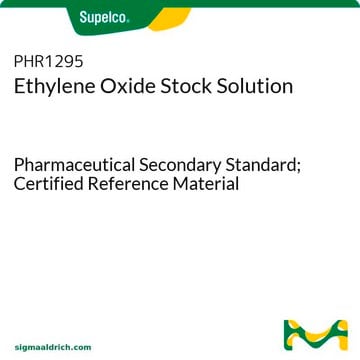30107
Hydrofluoric acid
puriss. p.a., ACS reagent, reag. ISO, reag. Ph. Eur., ≥48%
Synonym(s):
HF
About This Item
Recommended Products
grade
ACS reagent
puriss. p.a.
Agency
reag. ISO
reag. Ph. Eur.
vapor density
1.27 (vs air)
vapor pressure
25 mmHg ( 20 °C)
Assay
≥48%
form
liquid
impurities
≤0.005% hexafluorosilic acid (H2SiF6)
ign. residue
≤0.0005% (as SO4)
density
1.15 g/mL at 25 °C (lit.)
anion traces
chloride (Cl-): ≤1 mg/kg
phosphate (PO43-): ≤0.5 mg/kg
sulfate (SO42-): ≤2 mg/kg
sulfite (SO32-): ≤2 mg/kg
cation traces
Ag: ≤0.02 mg/kg
Al: ≤0.05 mg/kg
As: ≤0.05 mg/kg
Ba: ≤0.1 mg/kg
Be: ≤0.02 mg/kg
Bi: ≤0.1 mg/kg
Ca: ≤0.5 mg/kg
Cd: ≤0.01 mg/kg
Co: ≤0.02 mg/kg
Cr: ≤0.02 mg/kg
Cu: ≤0.02 mg/kg
Fe: ≤0.2 mg/kg
Ge: ≤0.05 mg/kg
K: ≤0.1 mg/kg
Li: ≤0.02 mg/kg
Mg: ≤0.2 mg/kg
Mn: ≤0.05 mg/kg
Mo: ≤0.05 mg/kg
Na: ≤0.2 mg/kg
Ni: ≤0.02 mg/kg
Pb: ≤0.05 mg/kg
Sr: ≤0.02 mg/kg
Ti: ≤0.1 mg/kg
Tl: ≤0.05 mg/kg
V: ≤0.05 mg/kg
Zn: ≤0.05 mg/kg
Zr: ≤0.1 mg/kg
SMILES string
[H+].[F-]
InChI
1S/FH/h1H
InChI key
KRHYYFGTRYWZRS-UHFFFAOYSA-N
Looking for similar products? Visit Product Comparison Guide
General description
Application
- Speciation of tin ions in oxide glass containing iron oxide through solvent extraction and inductively coupled plasma atomic emission spectrometry after the decomposition utilizing ascorbic acid.: This study explores the speciation of tin ions in iron oxide-containing glass, utilizing ascorbic acid for decomposition followed by solvent extraction and analysis via inductively coupled plasma atomic emission spectrometry, highlighting a novel analytical chemistry application of hydrofluoric acid (Saijo Y et al., 2022).
- Physicochemical and morphological characterization of a glass ceramic treated with different ceramic primers and post-silanization protocols.: This paper discusses the effects of various ceramic primers and silanization protocols on the physicochemical properties and morphology of glass ceramics, contributing to analytical chemistry by elucidating the interactions and stability of treated surfaces (Moreno MBP et al., 2019).
- Effect of Surface Cleaning Regimen on Glass Ceramic Bond Strength.: Investigates the impact of different surface cleaning regimens, including the use of hydrofluoric acid, on the bond strength of glass ceramics, providing insights into optimal surface treatment methods in material science and analytical chemistry (Lapinska B et al., 2019).
Signal Word
Danger
Hazard Statements
Precautionary Statements
Hazard Classifications
Acute Tox. 1 Dermal - Acute Tox. 2 Inhalation - Acute Tox. 2 Oral - Eye Dam. 1 - Skin Corr. 1A
Storage Class Code
6.1A - Combustible acute toxic Cat. 1 and 2 / very toxic hazardous materials
WGK
WGK 2
Flash Point(F)
Not applicable
Flash Point(C)
Not applicable
Certificates of Analysis (COA)
Search for Certificates of Analysis (COA) by entering the products Lot/Batch Number. Lot and Batch Numbers can be found on a product’s label following the words ‘Lot’ or ‘Batch’.
Already Own This Product?
Find documentation for the products that you have recently purchased in the Document Library.
Articles
Professor Gogotsi and Dr. Shuck introduce MXenes: a promising family of two-dimensional materials with a unique combination of high conductivity, hydrophilicity, and extensive tunability.
Professor Gogotsi and Dr. Shuck introduce MXenes: a promising family of two-dimensional materials with a unique combination of high conductivity, hydrophilicity, and extensive tunability.
Professor Gogotsi and Dr. Shuck introduce MXenes: a promising family of two-dimensional materials with a unique combination of high conductivity, hydrophilicity, and extensive tunability.
Professor Gogotsi and Dr. Shuck introduce MXenes: a promising family of two-dimensional materials with a unique combination of high conductivity, hydrophilicity, and extensive tunability.
Our team of scientists has experience in all areas of research including Life Science, Material Science, Chemical Synthesis, Chromatography, Analytical and many others.
Contact Technical Service






